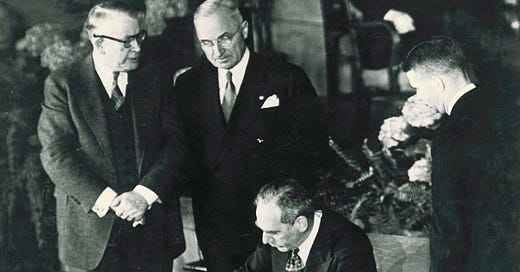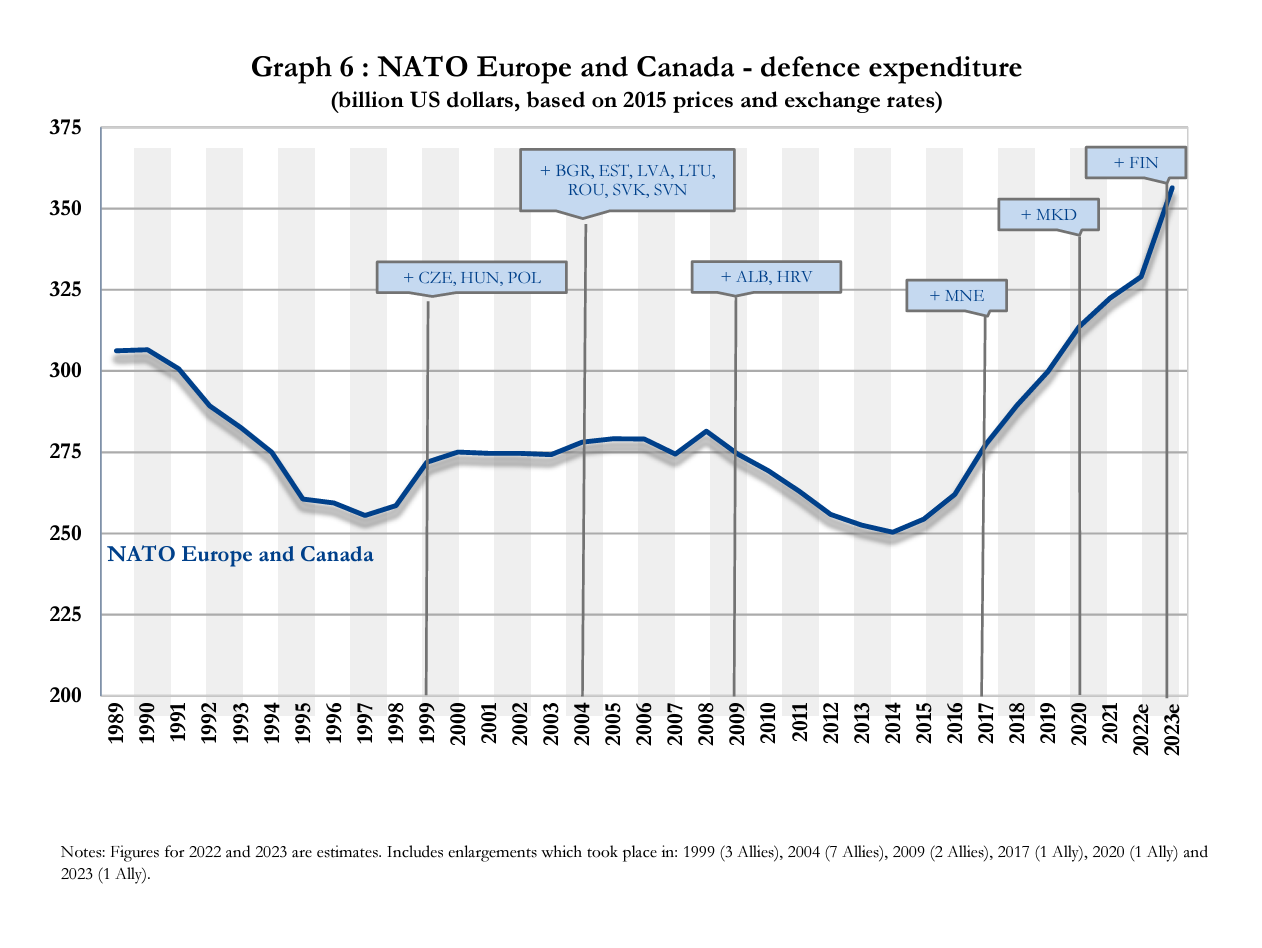There he goes again. At a campaign rally in South Carolina last night, Donald Trump engaged in one of his favorite pastimes: denigrating NATO. He repeated an oft-told story that at a meeting of NATO leaders he warned allies that he wouldn’t defend them unless they “paid up.”
But then he went further, recounting how he told the president of “a big country” who asked “if we’re attacked by Russia, will you protect us?”
Trump’s response was mind-blowing:
“No, I would not protect you. In fact, I would encourage them to do whatever the hell they want.”
To be clear—Trump not only said he would not help defend an ally if it were attacked by Russia, but he would actually “encourage” Russia “to do whatever the hell they want.”
All of this is based on a profoundly mistaken view of what NATO is, how it works, and why it matters to the United States. And in four years as president and the three years since, Trump has refused to get NATO right.

So, let me try one more time to set him straight. (My earlier attempt on his then-favorite medium obviously failed to do so.)
Who Spends What
First of all, let’s get the facts straight on the question of defense spending. Trump continues to believe that NATO countries should pay the United States to defend them. As he told Chancellor Angela Merkel after their first Oval Office meeting in March 2017, “Chancellor, you’re terrific. But you owe me one trillion dollars.”
He was wrong then. And he is still wrong today when he says countries are “delinquent” and don’t “pay up.”
There are two ways NATO countries spend on defense: national contributions to common NATO funds (both for civilian and military purposes) and national spending on their own defense. NATO common funding pays for the headquarters, salaries of employees, military command structure, and infrastructure. The annual cost of these funds in 2023 was about $3.6 billion—or about 0.3% of total spending on defense by all NATO countries. Each ally contributes according to an agreed formula, based on relative national income. No country is delinquent on their contribution.
The vast bulk of defense spending is contributed by nations funding their own defenses. It’s true that the United States accounts for the vast majority of total defense spending among NATO countries. It’s also irrelevant. America’s defense budget (in contrast to those of most Europeans) is not solely or even mainly committed to NATO. The United States is a global power with global interests. Its military capability and global presence undergirds the global order—and helps prevent great power and deter aggression. It’s a vital contribution to American—and global—security. And we would be spend that NATO or no NATO. Indeed, we would have to spend more if there was no NATO.
That said, it’s true that many NATO nations have not spent enough on the defense. And it’s equally true that every American president since Harry S Truman has urged European allies to do more. Trump was hardly the first. Nor the last.
But it’s also true that NATO countries have increased defense spending significantly over the past decade. In 2014, following Russia’s initial invasion of Ukraine and annexation of Crimea, NATO countries agreed to start spending more. Specifically, countries that were spending at least 2% of GDP on defense “will continue to aim to do so.” Those spending less committed to “halt any decline in defense expenditure,” and “aim to move towards the 2% guideline within a decade”—that is, by 2024.
Following Russia’s full scale invasion of Ukraine in 2022, NATO leaders went further by committing to spending a “minimum” 2% on defense and noting that “in many cases, expenditure beyond 2% of GDP will be needed in order to remedy existing shortfalls and meet the requirements across all domains arising from a more contested security order.” Most NATO nations, including Germany, are set to hit this mark this year.
Here’s how NATO European countries and Canada have responded:
Defense spending reductions bottomed out in 2014, and started to go up that year. Spending increases accelerated in 2022. If any one person is responsible for getting Europeans to spend more on defense, it’s Vladimir Putin. Not Donald Trump.
The US Military is Not an Army for Hire
Not only is Trump wrong about NATO defense spending. He is profoundly wrong to suggest that the US military is an army for hire. After all, promising to protect those who do “pay up” implies that the United States will go to war to defend another country if it gets paid for doing so. But paying the US military is the responsibility of the American taxpayer—and their congressional representatives. Not of any foreign government. And that is how it should be.
Americans join the military out of a sense of duty and need to serve a larger purpose than themselves. They deploy overseas to try and keep the peace—deter attacks on friendly countries, keep sea lanes open for commerce, help those in need following natural disasters, defeat those who would do us harm, and for so many other reasons. Yes, they get paid and learn skills that might be useful in later life. But they don’t get paid much—and most would fair far better in the civilian economy. Theirs is a much larger purpose. And we should be deeply grateful to them for their service and sacrifice.
So it is deeply shameful to suggest that our military is for hire. That, if only you pay enough, Uncle Sam’s soldiers, sailors, marines, and airmen will come to the rescue. That’s unbecoming. It’s unAmerican.
NATO is about security, not spending
The core problem with Trump’s view of NATO is not who spends what and why, but what all of that spending is for. NATO is a defensive alliance, established 75 years ago to prevent war on a continent that had produced two world wars and twice drawn the United States from afar into the fight. Farsighted leaders in Europe and the United States—people like Dean Acheson, Ernest Bevin, Alcide De Gasperi, and Robert Schuman—understood the old dictum: “Si vis pacem, para bellum.” And the best way to prepare for war was a strong alliance that bound Europe and North America together.
For 75 years, NATO has stood the test of time. World War III was prevented. At least so far. Vladimir Putin’s decision to launch a full-scale invasion shattered the prevailing assumption that large-scale war could not return to the continent. But, paradoxically, Russia’s actions have underscored NATO’s centrality. Before the fighting started, NATO leaders made two things clear: That NATO would not directly defend Ukraine because it was not a NATO member; and NATO would defend “every inch” of NATO territory. In other words, had Ukraine been a member of NATO the war would not have happened. That is the real lesson of this tragic, horrific war.
NATO is therefore fundamental to preventing war in Europe. And America has an overriding interest in making sure war does not return to the continent. Europe is home to our closest allies, our largest trading partners, our biggest investments, and the largest number of vibrant democracies in the world. When Europe is free, America is free. When Europe prospers, America prospers. When Europe is secure, America is secure.
We forget this verity at our peril. It’s what Trump does not seem to get or want to understand. After the 100,000s of people killed and wounded as a result of Putin’s evil effort to subjugate a neighbor and its people, the idea that any American would encourage Russia “to do whatever the hell they want” in Europe is, reprehensible. And wrong.
The Consequences of Being Wrong
There are those who believe that if Trump is elected come November, NATO will be just fine. Our European allies will then finally get it and start paying their fair share for the common defense. But Trump’s views of NATO have little if anything to do with how much individual countries spend on defense. He just doesn’t believe in the value of NATO or alliances generally. During his time in office, he was equally dismissive of South Korea and Japan, two Asian allies that spend a great deal on defense and defray large parts of the cost to the United States of hosting US troops on their soil. (Interesting side note, Japan announced in 2022 that it would double defense spending in the coming years. It was Putin’s invasion of Ukraine, rather than Trump’s haranguing, that led to that change).
And our allies know that the problem is Trump rather than their own lack of spending. They understand that alliances are about common interests and based on trust—and that Trump doesn’t share those common interests and that America won’t be a trusted ally if he were to return to power.
They will likely continue to spend more on defense—not to satisfy the United States, but to compensate for America’s possible retreat from the world stage, which would make the world a far more dangerous place.
To be sure, Europeans spending more and getting serious about defense is a good thing and to be encouraged. But it would be far better if that were the consequences of an agreed rebalancing of responsibilities among allies rather than to compensate for the distrust (or even possible withdrawal) of the US commitment to NATO.
America needs a strong, capable Europe. But Europe needs a strong, committed, and credible America to continue to stand shoulder-by-shoulder to defend security in Europe and beyond. Failing to do that would be the biggest consequences of getting NATO wrong.







Excellent Insights. Ironically, the Twitter World is now with Full of Pro - Trump and Pro - Russia Sympathizers especially after this Tucker Carlson Interview. They need to Understand the History and this Piece has come out at the right time.
'NATO is the part of United States creation. Of course the Nazi Germany war would be different if the United States didn't join in 1941, and the post war Europe was built economically with the Marshall Plan , and structurally with Liberal democracy in countries' that once had an authoritarian past like West Germany and Italy . It's all the influence of the United States. If it goes after all against this, then the repercussions will be huge .
( Post war by Tony Judt is a compelling read )